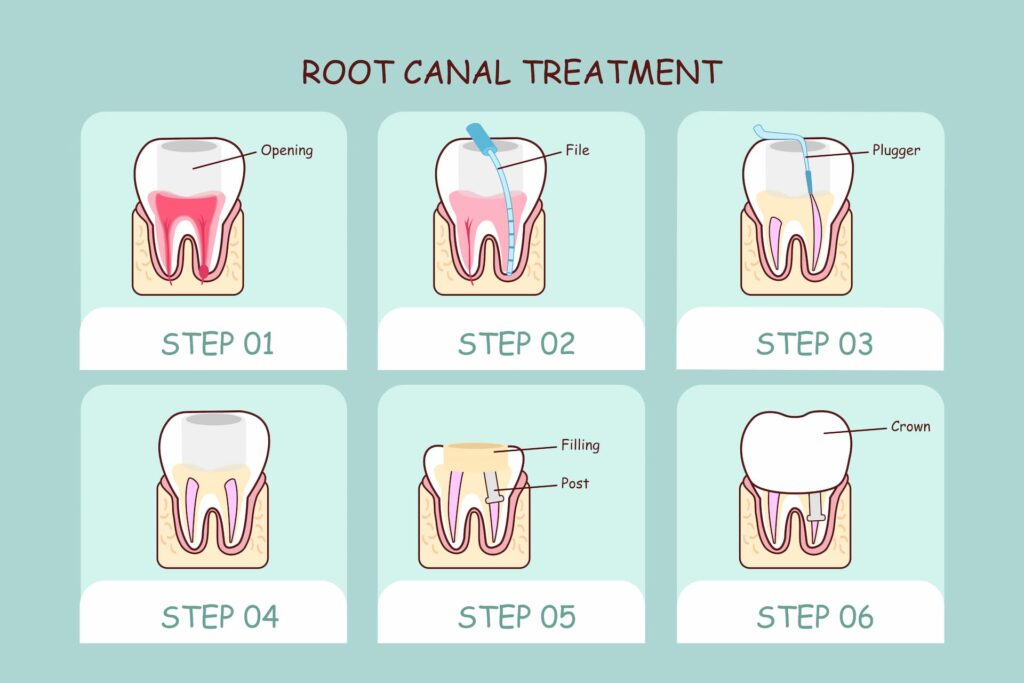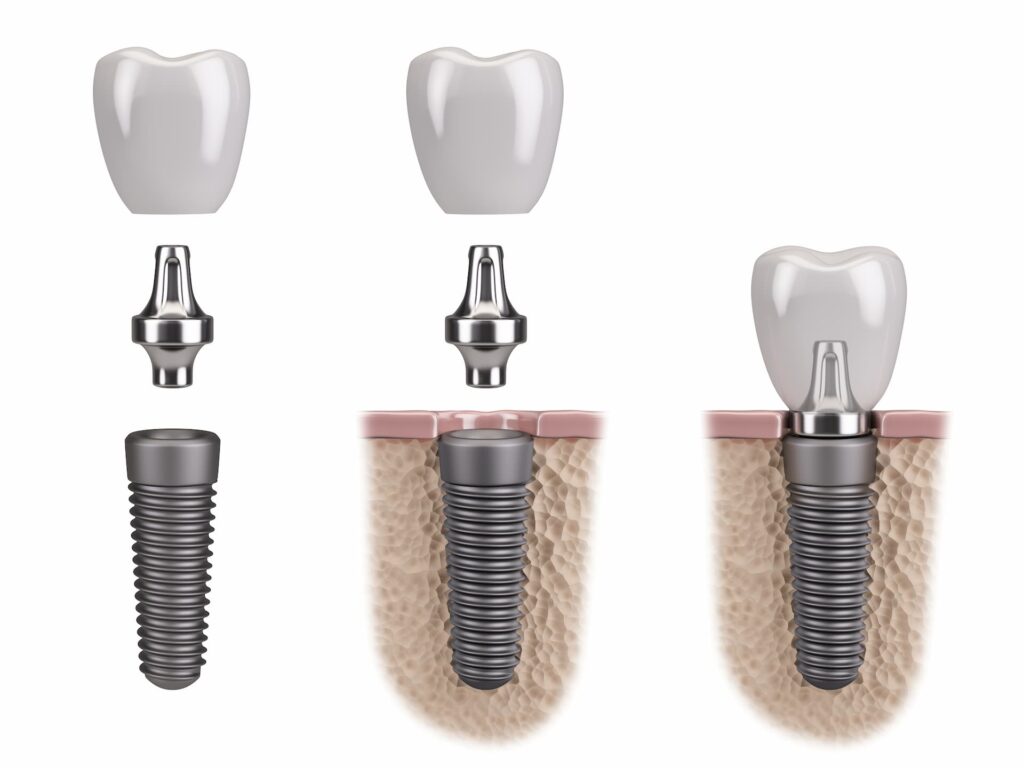When it comes to choosing between a root canal and a dental implant, the choice is never simple. Both are procedures used to treat damaged or decayed teeth, but there are distinctive differences between them.
A root canal involves removing the damaged or decayed pulp from inside the tooth, while a dental implant is a surgical procedure that involves inserting a titanium screw into the bone of the upper or lower jaw in order to replace a missing tooth. The condition of the tooth and your overall health are vital factors that need to be considered.
But how do you know which one is best?
That’ll be up to you and your individual needs. It’s easier than you think though, we’ve put together this guide to help you decide: root canal, or dental implant?
What is a Root Canal?

A root canal is a dental procedure used to repair and save a severely damaged or infected tooth and can help save the tooth and prevent the need for extraction.
It involves removing the infected or damaged pulp (soft tissue) inside the tooth and cleaning the inside of the tooth. People might need a root canal when the pulp of the tooth becomes infected due to deep decay, cracks, or chips or as a result of trauma.
The procedure is simple and takes place over two to three visits. During the first visit, the dentist will take X-rays to determine the extent of the infection. Then, the dentist will administer an anesthetic, drill an access hole, remove the infection and pulp, and clean the inside of the tooth; the dentist might seal the tooth with a temporary filling before placing a permanent filling to protect the tooth from further damage, or simply place the permanent filling on the same day.
Although root canal procedures have a reputation for being painful, most patients experience little to no discomfort during the procedure. This is largely thanks to anesthesia, as it typically ensures a pain-free experience.
But once the anesthesia wears off, some discomfort and pain may occur, but again, these symptoms can be treated with pain medication. Many people say the pain and discomfort are worth the benefits of getting a root canal.
Getting it can preserve the natural tooth structure, avoid more invasive procedures such as dental implants or bridges, and reduce the risk of infection. Root canals also help restore the tooth’s normal function and appearance, allowing you to eat, speak, and smile confidently.
What is a Dental Implant?

A dental implant is a permanent and secure solution for people who have missing or failing teeth. It consists of an artificial tooth root from titanium surgically placed in the jawbone. This act of implantation replaces the root of the missing tooth, creating a strong foundation for a replacement tooth.
People may need a dental implant if they have missing or failing teeth, as it can help restore full function and aesthetics, prevent facial collapse, and provide a permanent and natural-looking solution.
The dental implant procedure usually takes 12 weeks to complete. First, a 3D scan will determine which implants you need and where. Your next dentist visit will be where you get your new implants- and the best part is you don’t have to feel a thing. You can be sedated while your new implants are inserted and go home with your new implants and a new smile.
During the following weeks, you will likely have several follow-up appointments, where the dentist will analyze the recovery process and make any adjustments necessary. After several follow-ups and approximately 14 weeks, you can walk out with the smile you’ve always wanted.
Although the dental implant procedure is usually painless, patients may experience some mild discomfort, such as swelling, bruising, or minor bleeding. These symptoms are usually minor and can be managed with over-the-counter or prescription medications.
Again, the discomfort people feel is often nothing compared to the benefits of getting dental implants!
It is a permanent solution that helps restore full function, prevents facial collapse, and is much more natural-looking than dentures. It also helps maintain the integrity of the jawbone, which can help prevent the deterioration of the jawbone and facial structure.
Additionally, it can help maintain the bite relationship and help protect other teeth from excessive wear and tear.
But what sets dental implants apart from the rest is they are designed to look, feel, and function just like natural teeth. They are more comfortable and secure than dentures and can help restore full function and aesthetics. Implants can last for years with proper care and maintenance, making them a more cost-effective solution than dentures.
Comparing the Root Canal and Dental Implants
| Root Canal | Dental Implant | |
| Solution for: | Preserve tooth structure | Replace tooth |
| Procedure: | Removal of infected pulp and refilling with special material | Titanium post inserted in jawbone, and an artificial tooth is attached |
| Used for: | Treating an infection | Replacing a tooth or helping stabilize a weak tooth |
| Success Rate: | High success rate, unless all of infected site is removed | High success rate |
| Risks or complications: | Can be prone to infection and can also not a guarantee that the infection can be completely removed, causing recurring pain and problems | Requires a lengthy recovery period and can cause nerve damage if not performed correctly |
So, which one should you choose?

Root canals are preferred over dental implants when the tooth is severely damaged, decayed, or infected, as root canals are designed to save and preserve the natural tooth structure. Dental implants are preferred when a tooth is missing or when a tooth is too weak to be saved with a root canal.
In cases where the tooth is badly damaged, a root canal may not be feasible.
In such cases, dental implants may be the preferred option, as they can replace the missing tooth and provide a more permanent solution.
Another factor to consider is the cost- the reality is that healthcare isn’t always affordable. Let’s take a look at the cost considerations for both procedures.
Cost Considerations
The cost of a root canal is typically lower than the cost of a dental implant, but that can vary depending on the complexity of the procedure and the patient’s specific needs. Insurance coverage can also greatly impact the final cost, as some plans cover the cost of root canals and dental implants while others do not.
Some insurance plans will cover the cost of a root canal and/or a dental implant, while others may not. It is important to check with your provider to see what is covered and what is not.
In some cases, additional procedures like bone grafts may be necessary in order to properly place a dental implant. The cost of these procedures will vary depending on the complexity of the procedure and the patient’s specific needs, but they can be quite expensive. It is important to speak with your provider to determine if any additional procedures might be necessary and to get an estimate for the cost of those procedures.
But don’t always look at the immediate cost because it is important to consider the long-term cost implications when it comes to dental work. Root canals may need to be redone in the future, whereas dental implants are often considered to be a more permanent solution.
It is important to speak with your provider to get an estimate for the potential long-term costs associated with each procedure.
Making the Decision Between Root Canal and Dental Implant
Root canals and dental implants are both effective treatments for missing or failing teeth and both procedures have their pros and cons.
When making the decision between a root canal and a dental implant, there are a few important factors to consider. Weigh the pros and cons of each procedure, such as:
- How long the procedure takes.
- How long the results will last.
- How much the procedure will cost.
- Oral health.
- Ability to follow through with aftercare.
While you will have your own preference, this decision between the two should be made in consultation with a dentist.
FAQs
Is it better to get an implant or a root canal?
When considering root canal vs dental implant, evaluating each option’s advantages and disadvantages is important. Root canals are often more cost-effective than implants, but implants may be more aesthetically pleasing and last longer. Additionally, implants can be used to replace multiple teeth, while root canals are usually only used to treat a single tooth.
Is an implant less painful than a root canal?
The discomfort associated with both implants and root canals varies depending on the individual and their level of sensitivity. Generally, implants are less painful than root canals, but some people may experience more discomfort with the implant procedure due to the placement of the implant.
What are the disadvantages of a root canal?
Root canals have several potential drawbacks, including the risk of infection and the possibility of needing additional treatments. Additionally, root canals are generally less aesthetically pleasing than implants and can require more maintenance. And finally, root canals may also not last as long as implants.
Should I skip the root canal and just get an implant?
The decision to get an implant or root canal should be made on an individual basis. It is important to consider the advantages and disadvantages of each option and decide which option is best for the individual’s particular needs and budget.
How long does a root canal last?
The longevity of a root canal depends on how well the procedure is performed and the individual’s oral health.
Root Canal vs. Dental Implant: Choosing the Right Option
When it comes to tooth replacement, it’s important to understand the differences between root canals and dental implants. A root canal is a procedure that removes the infected pulp from the inside of a tooth, while a dental implant is a prosthetic tooth that is surgically implanted into the jawbone.
Your dentist will be able to evaluate the condition of your tooth and explain the pros and cons of each procedure.
At Hanna Dental Implant Center, we provide all treatments necessary for all implant-related procedures. Our board-certified periodontists have over 14 years of experience and have successfully completed thousands of implant procedures. We prioritize our patient’s well-being and strive to provide life-long, anxiety-free solutions for failing or missing teeth.
Contact us today to start your journey to a better smile.



